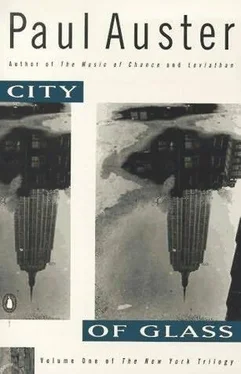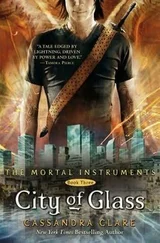Paul Auster - City of Glass
Здесь есть возможность читать онлайн «Paul Auster - City of Glass» весь текст электронной книги совершенно бесплатно (целиком полную версию без сокращений). В некоторых случаях можно слушать аудио, скачать через торрент в формате fb2 и присутствует краткое содержание. Жанр: Современная проза, на английском языке. Описание произведения, (предисловие) а так же отзывы посетителей доступны на портале библиотеки ЛибКат.
- Название:City of Glass
- Автор:
- Жанр:
- Год:неизвестен
- ISBN:нет данных
- Рейтинг книги:5 / 5. Голосов: 1
-
Избранное:Добавить в избранное
- Отзывы:
-
Ваша оценка:
- 100
- 1
- 2
- 3
- 4
- 5
City of Glass: краткое содержание, описание и аннотация
Предлагаем к чтению аннотацию, описание, краткое содержание или предисловие (зависит от того, что написал сам автор книги «City of Glass»). Если вы не нашли необходимую информацию о книге — напишите в комментариях, мы постараемся отыскать её.
City of Glass — читать онлайн бесплатно полную книгу (весь текст) целиком
Ниже представлен текст книги, разбитый по страницам. Система сохранения места последней прочитанной страницы, позволяет с удобством читать онлайн бесплатно книгу «City of Glass», без необходимости каждый раз заново искать на чём Вы остановились. Поставьте закладку, и сможете в любой момент перейти на страницу, на которой закончили чтение.
Интервал:
Закладка:
"Ready."
"The initials H.D. in the name Henry Dark refer to Humpty Dumpty. "
"Who?"
"Humpty Dumpty. You know who I mean. The egg."
"As in 'Humpty Dumpty sat on a wall.'?"
"Exactly.
"I don't understand."
"Humpty Dumpty: the purest embodiment of the human condition. Listen carefully, sir. What is an egg? It is that which has not yet been born. A paradox, is it not? For how can Humpty Dumpty be alive if he has not been born? And yet, he is alive-make no mistake. We know that because he can speak. More than that, he. is a philosopher of language. 'When I use a word, Humpty Dumpty said, in rather a scornful tone, it means just what I choose it to mean-neither more nor less. The question is, said Alice, whether you can make words mean so many different things. The question is, said Humpty Dumpty, which is to be master-that's all.
"Lewis Carroll."
"Through the Looking Glass, chapter six."
"Interesting.”
"It's more than interesting, sir. It's crucial. Listen carefully, and perhaps you will learn something. In his little speech to Alice, Humpty Dumpty sketches the future of human hopes and gives the clue to our salvation: to become masters of the words we speak, to make language answer our needs. Humpty Dumpty was a prophet, a man who spoke truths the world was not ready for."
"A man?"
"Excuse me. A slip of the tongue. I mean an egg. But the slip is instructive and helps to prove my point. For all men are eggs, in a manner of speaking. We exist, but we have not yet achieved the form that is our destiny. We are pure potential, an example of the not-yet-arrived. For man is a fallen creature-we know that from Genesis. Humpty Dumpty is also a fallen creature. He falls from his wall, and no one can put him back together again-neither the king, nor his horses, nor his men. But that is what we must all now strive to do. It is our duty as human beings: to put the egg back together again. For each of us, sir, is Humpty Dumpty. And to help him is to help ourselves."
"A convincing argument."
"It's impossible to find a flaw in it."
"No cracks in the egg."
"Exactly."
"And, at the same time, the origin of Henry Dark."
"Yes. But there is more to it than that. Another egg, in fact. "
"There's more than one?"
"Good heavens, yes. There are millions of them. But the one I have in mind is particularly famous. It's probably the most celebrated egg of all.
"You're beginning to lose me."
"I'm speaking of Columbus 's egg."
"Ah, yes. Of course."
"You know the story?"
"Everyone does."
"It's charming, is it not? When faced with the problem of how to stand an egg on its end, he merely tapped slightly on the bottom, cracking the shell just enough to create a certain flatness that would support the egg when he removed his hand."
"It worked."
"Of course it worked. Columbus was a genius. He sought paradise and discovered the New World. It is still not too late for it to become paradise."
"Indeed.
"I admit that things have not worked out too well yet. But there is still hope. Americans have never lost their desire to discover new worlds. Do you remember what happened in 1969?"
"I remember many things. What do you have in mind?"
"Men walked on the moon. Think of that, dear sir. Men walked on the moon!"
"Yes, I remember. According to the President, it was the greatest event since creation."
"He was right. The only intelligent thing that man ever said. And what do you suppose the moon looks like?"
"I have no idea."
"Come, come, think again."
"Oh yes. Now I see what you mean."
"Granted, the resemblance is not perfect. But it is true that in certain phases, especially on a clear night, the moon does look very much like an egg."
"Yes. Very much like."
At that moment, a waitress appeared with Stillman's breakfast and set it on the table before him. The old man eyed the food with relish. Decorously lifting a knife with his right hand, he cracked the shell of his soft-boiled egg and said, "As you can see, sir, I leave no stone unturned."
The third meeting took place later that same day. The afternoon was well advanced: the light like gauze on the bricks and leaves, the shadows lengthening. Once again, Stillman retreated to Riverside Park, this time to the edge of it, coming to rest on a knobby outcrop at 84th Street known as Mount Tom. On this same spot, in the summers of 1843 and 1844, Edgar Allan Poe had spent many long hours gazing out at the Hudson. Quinn knew this because he had made it his business to know such things. As it turned out, he had often sat there himself.
He felt little fear now about doing what he had to do. He circled the rock two or three times, but failed to get Stillman's attention. Then he sat down next to the old man and said hello. Incredibly, Stillman did not recognize him. This was the third time Quinn had presented himself, and each time it was as though Quinn had been someone else. He could not decide whether this was a good sign or bad. If Stillman was pretending, he was an actor like no other in the world. For each time Quinn had appeared, he had done it by surprise. And yet Stillman had not even blinked. On the other hand, if Stillman really did not recognize him, what did this mean? Was it possible for anyone to be so impervious to the things he saw?
The old man asked him who he was.
"My name is Peter Stillman," said Quinn.
"That's my name," answered Stillman. "I'm Peter Stillman."
"I'm the other Peter Stillman," said Quinn.
"Oh. You mean my son. Yes, that's possible. You look just like him. Of course, Peter is blond and you are dark. Not Henry Dark, but dark of hair. But people change, don't they? One minute we're one thing, and then another another."
"Exactly."
"I've often wondered about you, Peter. Many times I've thought to myself, 'I wonder how Peter is getting along.' "I'm much better now, thank you."
"I'm glad to hear it. Someone once told me you had died. It made me very sad."
"No, I've made a complete recovery."
"I can see that. Fit as a fiddle. And you speak so well, too."
"All words are available to me now. Even the ones most people have trouble with. I can say them all."
"I'm proud of you, Peter."
"I owe it all to you."
"Children are a great blessing. I've always said that. An incomparable blessing."
"I'm sure of it."
"As for me, I have my good days and my bad days. When the bad days come, I think of the ones that were good. Memory is a great blessing, Peter. The next best thing to death."
"Without a doubt."
"Of course, we must live in the present, too. For example, I am currently in New York. Tomorrow, I could be somewhere else. I travel a great deal, you see. Here today, gone tomorrow. It's part of my work."
"It must be stimulating."
"Yes, I'm very stimulated. My mind never stops."
"That's good to hear."
"The years weigh heavily, it's true. But we have so much to be thankful for. Time makes us grow old, but it also gives us the day and the night. And when we die, there is always someone to take our place."
"We all grow old."
"When you're old, perhaps you'll have a son to comfort you.”
"I would like that."
"Then you would be as fortunate as I have been. Remember, Peter, children are a great blessing."
"I won't forget."
"And remember, too, that you shouldn't put all your eggs in one basket. Conversely, don't count your chickens before they hatch. "
"No. I try to take things as they come."
"Last of all, never say a thing you know in your heart is not true."
“I won't.”
"Lying is a bad thing. It makes you sorry you were ever born. And not to have been born is a curse. You are condemned to live outside time. And when you live outside time, there is no day and night. You don't even get a chance to die."
Читать дальшеИнтервал:
Закладка:
Похожие книги на «City of Glass»
Представляем Вашему вниманию похожие книги на «City of Glass» списком для выбора. Мы отобрали схожую по названию и смыслу литературу в надежде предоставить читателям больше вариантов отыскать новые, интересные, ещё непрочитанные произведения.
Обсуждение, отзывы о книге «City of Glass» и просто собственные мнения читателей. Оставьте ваши комментарии, напишите, что Вы думаете о произведении, его смысле или главных героях. Укажите что конкретно понравилось, а что нет, и почему Вы так считаете.












